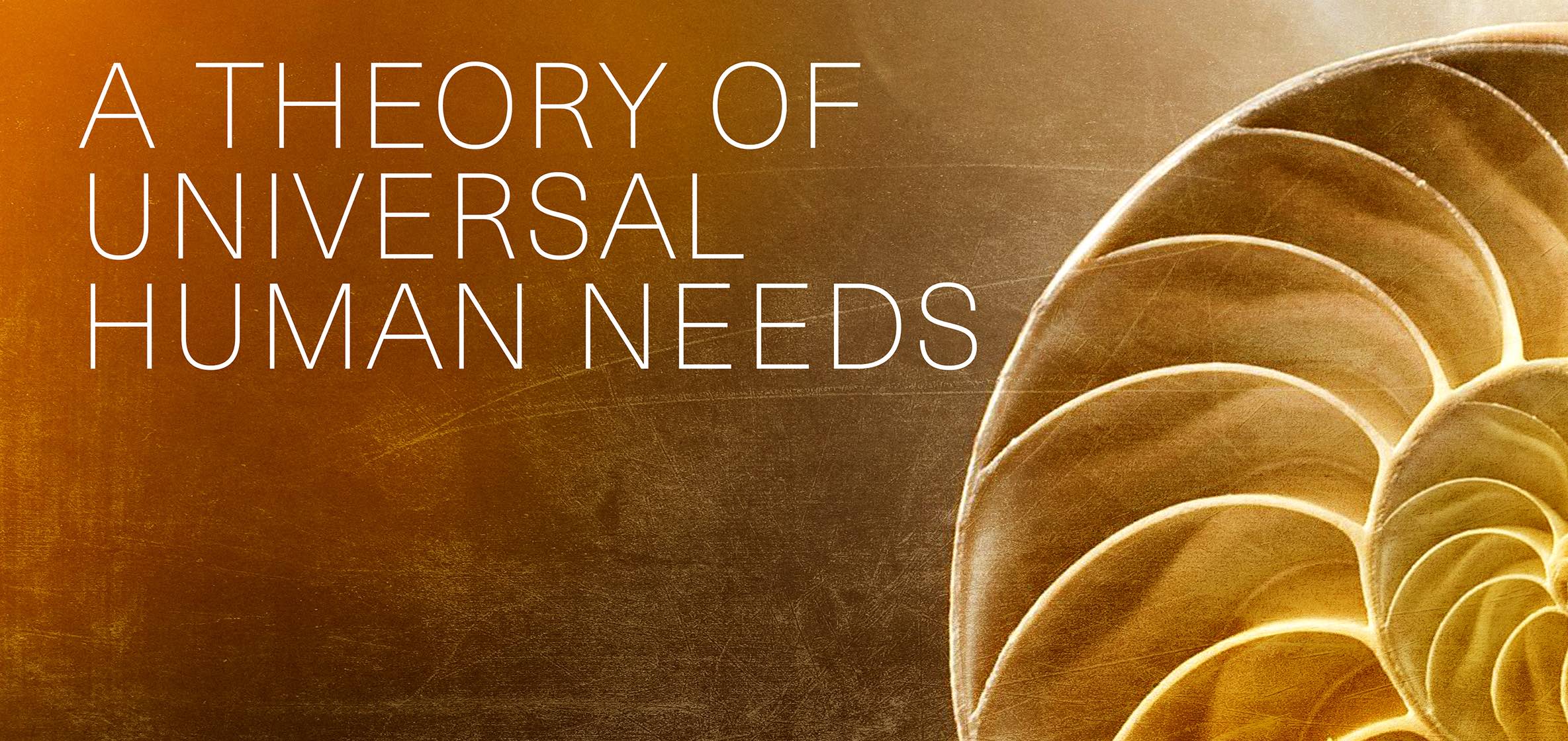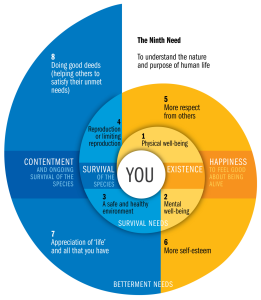A theory of universal human needs

Even simpler than Abraham Maslow’s 5-tier Hierarchy of Needs, and Clayton Alderfer’s 3-part ERG Theory, my Theory of Universal Human Needs has just two types of need: survival and betterment.
Why we do the things we do.
| Survival needs | Betterment needs | |
|---|---|---|
| Individual goals | EXISTENCE | HAPPINESS (to feel good about being alive) |
| Individual needs | 1. Physical well-being
2. Mental well-being |
5. More respect from others
6. More self-esteem |
| Species goals | SURVIVAL of the species |
CONTENTMENT (and ongoing survival of the species) |
| Species needs | 3. A safe and healthy environment
4. Reproduction or limiting reproduction |
7. Appreciation of ‘life’ and all that you have
8. Doing good deeds (helping others to satisfy their unmet needs) |
First published January 2005
Notes
In each of the four sectors, the first need is a pre-requisite of the second need.
 1, 2. Sufficient physical and mental health, food and water, safety and security, structure and belongingness, love and respect from others, and self-esteem, to be alive and to want to stay alive.
1, 2. Sufficient physical and mental health, food and water, safety and security, structure and belongingness, love and respect from others, and self-esteem, to be alive and to want to stay alive.
5, 6. How much ‘more’ appears to depend on both our individual personalities and characteristics (nature) and our experiences and environment (nurture).
There are more relationships between the eight needs and four goals than can be clearly shown via a two-dimensional (flat) table so I have developed, with the help of graphic designer Jeroen ten Berge, a more sophisticated nautilus diagram of the theory.
Introduction | Article | Nautilus diagram | Translations
Whenever the four survival needs are met, humans attempt to satisfy their four betterment needs, which are the needs we must satisfy to improve the quality of our existence. Satisfying the first two produces transitory happiness. Satisfying the last two produces lasting contentment for the individual and contributes directly to the ‘ongoing survival of the species’.
When perspective and historical context is added to the mix, two important insights come to light. First, our betterment needs ultimately make us better at surviving. And second, without recognition of our ultimate goal (to contribute to the ongoing survival of our species), most of us whose survival needs are met are subsequently left goalless.
Unlike a focused subsistence farmer, appreciative of food eaten and days survived, we wake up each day unsure of what we should be doing. And our natural motivation for ‘better’ — so long as we fail to understand it—is easily manipulated into an insatiable want for ‘more’, which leaves us perpetually dissatisfied and frustrated. We want fame, to be known by many; we need the love and the respect of a few. So how do most of us spend our time? Climbing ladders away from our family and friends.
We over-consume to our everyday detriment, each item devaluing the others we already have so we feel poor and cluttered. And we produce so much unnecessary waste that we are degrading our own (and only) environment. Unchecked, we will push ourselves back to subsistence living.
In other words, we (the wealthiest, most privileged humans of all time) are muddling up our own lives and, increasingly, the lives of others. We have, surely, misread the instructions.
As the Chilean economist Manfred Max-Neef points out, human needs are few, finite, and classifiable. It is in the infinite ways that we satisfy those needs that the diversity, wastage, and muddle occurs. But to improve the quality of our ‘satisfiers’ — the disparate acts we perform to satisfy our needs — first requires us to understand our universal needs and the fundamental goal they innately motivate us to achieve: ongoing survival of our truly incredible species.


